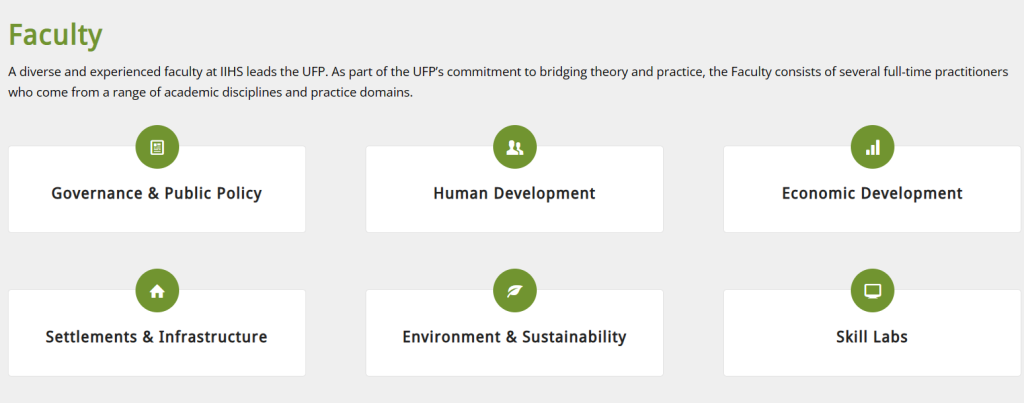Shape India’s Urban Transition
Urban Fellows Programme 2023-24 – Indian Institute for Human Settlements (IIHS)

![]()
The Indian Institute for Human Settlements (IIHS) is a national education institution and a prospective national university, committed to the equitable, sustainable and efficient transformation of urban Indian settlements. IIHS is a prospective independent national institution of eminence and innovation university focused on its urbanisation.
The Indian Institute for Human Settlements (IIHS) will create and nurture a unique, inclusive and innovative interdisciplinary knowledge-based university of global stature that is rooted in the plurality of Indian and other South Asian cultures, languages and scholarship and is open to all. It is focussed on the creation, dissemination and application of knowledge and practice in all matters connected with the establishment, operation and transformation of human settlements; more particularly human settlements located in India and South Asia.
The team within the institution brings together a wide range of multi-sectoral perspectives, experiences and skills to address a range of challenges and opportunities that IIHS works with. This ranges from strategy, regulation, resource mobilisation, financial management, institutional and human resources development, campus planning and development to core functions of curriculum development, teaching and research, training and development, consulting and advisory service delivery.
The IIHS Urban Fellows Programme (UFP) | 2023-24
India’s urban transition is unprecedented in scale and complexity. Within it lie both, the opportunities of economic development and greater employment as well as the challenges of persistent inequality, extreme deprivation and environmental degradation. The UFP offers the chance to be a part of shaping this transition.
UFP is scholarship-based, nine-month, full-time, residential, interdisciplinary and based at the IIHS City Campus in Bengaluru. It combines classroom teaching, site-based applied learning, work in live projects, and external internships to introduce Fellows to diverse forms of urban practice. The Programme is open to recent graduates and young professionals from varied educational backgrounds or practice domains. The seventh batch of UFP will graduate in May 2023.
UFP is scholarship-based, nine-month, full-time, residential, interdisciplinary and based at the IIHS, Bengaluru City Campus. It seeks to combine classroom teaching, site-based applied learning, and introduce Fellows to diverse forms of urban practice through a choice of independent projects; work in live IIHS projects; or external internships. The Programme is open to recent graduates and young professionals from varied educational backgrounds or practice domains.
Through the UFP, Fellows will:
- Understand issues of urbanisation in India and the Global South from multiple disciplinary perspectives.
- Learn from practice as young professionals seeking to enter the urban sector.
- Develop skills necessary to analyse, understand, and identify key urban issues in India.
- Build a foundation to design interdisciplinary urban interventions.
- Network with diverse global, national, and local thought leaders, entrepreneurs, and change makers.
- Learn from a diverse and experienced faculty who bring together theory and practice.
Our Motivation: The Urban Transition
- All candidates must have basic proficiency in reading English. There is support available for candidates with limited speaking ability in English and they are encouraged to apply.
- Candidates must be Indian citizens. OCI Card holders are not eligible to apply at this time.
- We strongly encourage applications from women, people with disabilities, and those from economically and socially excluded communities.
IIHS provides a diverse, inclusive, open, safe and enabling learning environment. It is committed to the principle of not discriminating against individuals on the basis of personal beliefs or characteristics such as caste, class, religion, region, ethnicity, race, gender, sexual orientation, age, marital status or disability. The UFP is part of this commitment to create supportive teaching and learning environments. Fellows are also expected to aspire to the highest standards of ethics in their personal and professional interactions.
ADMISSIONS POLICY
- The UFP admissions policy is committed to enabling two kinds of diversity in the classroom.
- The first is disciplinary diversity across core methodological approaches within disciplines. This diversity is core to IIHS’ pedagogical values of imagining urban practice across disciplines and domains of practice. In IIHS, there is a shared acceptance of interdisciplinary exploration and engagement as valuable to the understanding of urban issues.
- The second kind of diversity is that of identity, socio-economic status and more generally, life experience. The UFP admissions policy places diversity in the classroom as a valuable end in itself which enriches the learning environment by bringing diverse life experiences into the classroom. Further, there is recognition of historical inequalities and hardships in society.
The two-step UFP admissions process is as follows:
The Written Application
The first step is an evaluation of a written application that is structured to assess curiosity, inventive thinking, alignment with the UFP, as well as a strong desire to engage with urban questions, issues and challenges.
Interdisciplinary Selection
Applications are assessed within their respective disciplinary categories: for example, social scientists with other social scientists; engineers with other engineers; architects with other architects and so on.
Diversity of Identity and Life Experience
As part of the assessment of written applications, points are also accorded on the basis of the following criteria to ensure a diverse UFP class:
- Caste
- Religion
- Gender (including transgender)
- Education of the Mother and Father
- 10+2 Schooling in Non-Metropolitan Cities
- Type of Secondary Schooling (Central Public, State Public, Private)
- Differential Physical Ability
Individual applicants can potentially score points across multiple categories as applicable. However, the total of diversity points shall exceed no more than 15% of the total score of any candidate.
A final set of around 100-150 candidates, depending on total number of applications, will be shortlisted for the interview stage.
The Interview
In the interview stage, an assessment is conducted of the candidates’ curiosity, inventiveness and alignment with the UFP so that their expectations are well aligned with what is being offered in the UFP. All efforts are made to make the interview convivial, friendly and enabling – an opportunity for the candidate to showcase the best of themselves.
Final offers for admission to the UFP will be made based on a combination of scores from the written application and the interview.
IIHS Diversity Statement
IIHS aims to create a diverse, inclusive, open, safe and enabling learning environment. It is committed to the principle of not discriminating against individuals on the basis of personal beliefs or characteristics such as caste, class, religion, region, ethnicity, race, gender, sexual orientation, age, marital status or disability.
The UFP at IIHS is part of this commitment to create supportive teaching and learning environments. Fellows are expected to aspire to the highest standards of ethics in their personal and professional interactions. IIHS strongly encourages applications from women, persons with disabilities, and those from economically and socially excluded communities.
FEES AND SCHOLARSHIPS
The UFP is a scholarship-based, nine month, full-time, interdisciplinary and residential programme, delivered through seven months of in-class teaching at the IIHS City Campus in Bengaluru, followed by two months of internship placements in locations where a Fellow’s particular internship organisation is located.




